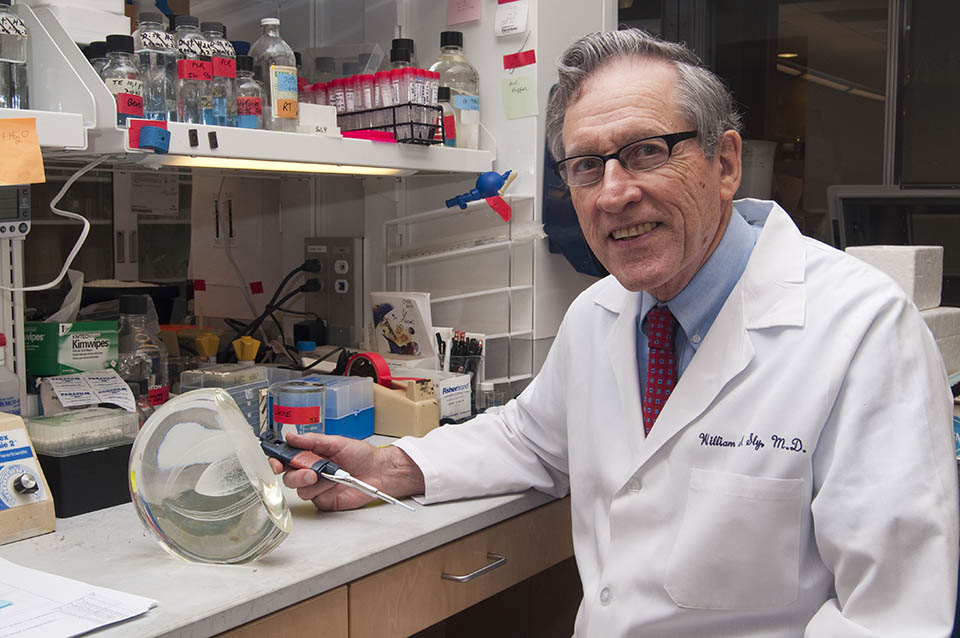William S. Sly, M.D.: 1932-2025
William S. Sly, M.D., professor emeritus of Biochemistry and Molecular Biology at Saint Louis University School of Medicine, died Saturday, May 31, 2025. He was 92.
An alumnus of Saint Louis University, Sly was an internationally known physician and scientist. He is perhaps best known for his work on the disease that now bears his name, Sly syndrome, which is also called mucopolysaccharidosis type VII (MPS-VII). His research team described the first patient with the disease, and later he helped develop an FDA-approved treatment.
Sly was born Oct. 19, 1932, in East St. Louis, Illinois. He earned his undergraduate degree from Saint Louis University in 1953 and his medical doctorate from the School of Medicine in 1957. He trained in internal medicine at Washington University in St. Louis and conducted research in National Institute of Health laboratories in Bethesda, Maryland, Madison, Wisconsin, and Paris, France.
In 1964, he began his academic work at Wash U, where he led the division of medical genetics for 20 years. In 1984, he returned to his alma mater to become the Alice A. Doisy Professor and Chairman of the Edward A. Doisy Department of Biochemistry and Molecular Biology. He chaired that department for 26 years.
“Bill defined us as ‘the BMB family,' through his leadership, integrity and scientific excellence,” said Enrico Di Cera, M.D., the current Alice A. Doisy professor and chairman of Biochemistry and Molecular Biology. “We will be forever grateful.”
In 2007, Sly was named the inaugural holder of the James B. and Joan C. Peter Endowed Chair in Biochemistry and Molecular Biology. Sly retired from SLU in 2014 and was named an emeritus professor.
Throughout his career, Sly has investigated causes and possible treatments of Sly syndrome and other MPS-related disorders. In 1973, Sly described the first case of mucopolysaccharidosis VII, a rare genetic condition that now bears his name. Sly syndrome can cause bone defects, developmental delays and intellectual disability, and premature death.
MPS diseases cause people to have physical and intellectual impairments and behavioral problems that worsen with age. Sly’s research into the disease has paved the way for an effective enzyme therapy treatment that dramatically changes the progression of some common MPS disorders.
Watch a video from Ultragenyx where Sly observes the first infusion of his enzyme replacement therapy for Sly syndrome in a very ill child who has now survived for nearly 12 years thanks to this treatment.
Sly also gained attention for his work in a forensic case involving a “murder mystery.” While watching an episode of television's “Unsolved Mysteries” involving a woman charged with poisoning her son, Sly noted that the type of urine test used to convict her could not rule out an inherited metabolic disorder with similar symptoms to poisoning. On a hunch, Sly and his colleague, the late James Shoemaker, M.D., independently conducted more tests, and the results pointed conclusively to a genetic disease. Sly presented this new evidence to the prosecution and, largely thanks to the analysis, the charges were dismissed.
Sly won numerous awards during his lengthy career. He was a member of the National Academy of Sciences and recipient of many awards and recognitions including the 1991 Passano Award (co-recipient); 1999 Coriell Medal; Peter H. Raven Lifetime Achievement Award from the Academy of Science of Saint Louis; Distinguished Scientist Award from the Clinical Ligand Assay Society; and 2010 Life for MPS award from the International MPS Network.
He was also the recipient of the Association of American Medical Colleges' 2011 Award for Distinguished Research in the Biomedical Sciences. Given to one recipient a year, the award recognizes outstanding clinical or laboratory research by a medical school faculty member related to health and disease that has contributed to the substance of medicine.
That honor and Sly’s career were the subject of a 2011 story in the St. Louis Post-Dispatch.
In 2011, he was honored with the School of Medicine Distinguished Teaching Award for small group facilitation. The award was chosen by the School of Medicine student body. He was recognized by SLU in 2017 with an Alumni Merit Award.
He is the author of more than 350 peer-reviewed journal articles and coauthor of The Molecular and Metabolic Bases of Inherited Disease.
In 2021, a mentee and colleague, Abdul Waheed, Ph.D., emeritus Research Professor of Biochemistry at SLU, gave $1 million to the Department of Biochemistry in honor of Sly. To recognize Waheed’s gift, the William S. Sly Centennial Chair was established.
“When I came to SLU, Dr. Sly became a trusted mentor, and I am proud to honor his legacy through a bequest,” said Waheed at the time he made his gift. “Celebrating the 100th year of the department by supporting an endowed chair and simultaneously recognizing Dr. Sly is a rewarding experience and essential for the future of research.”
In addition to the Centennial Chair, a Saint Louis University School of Medicine learning community house is named after Sly. The learning community program fosters meaningful connections between faculty, students, and administration by facilitating longitudinal mentorship opportunities and collaboration.
Sly is survived by his wife of 64 years, Peggy Sly. Bill and Peggy have seven children, 26 grandchildren and seven great-grandchildren.
In lieu of flowers, the family requests that contributions be made in Bill’s name to:
- The William S. Sly MD Centennial Chair in Biochemistry at the St. Louis University School of Medicine. Donations should specify the William. S. Sly chair fund.
- National MPS Society (P.O. Box 14686, Durham, NC 27709). This organization provides education, research funding, advocacy, and direct support to patients and families living with mucopolysaccharidosis.
Visitation will be at 9:30 a.m. on Saturday, June 28, at Our Lady of Lourdes Church, 7148 Forsyth, 63105. A memorial Mass beginning at 11 a.m. will follow the visitation.


















